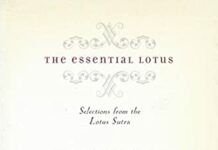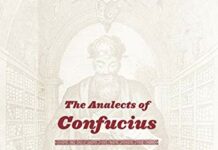
Ebook Info
- Published: 1996
- Number of pages: 160 pages
- Format: PDF
- File Size: 21.36 MB
- Authors: Burton Watson
Description
The basic writings of Chuang Tzu have been savored by Chinese readers for over two thousand years. And Burton Watson’s lucid and beautiful translation has been loved by generations of readers.Chuang Tzu (369?-286? B.C.) was a leading philosopher representing the Taoist strain in Chinese thought. Using parable and anecdote, allegory and paradox, he set forth, in the book that bears his name, the early ideas of what was to become the Taoist school. Central to these is the belief that only by understanding Tao (the Way of Nature) and dwelling in its unity can man achieve true happiness and freedom, in both life and death.Chuang Tzu: Basic Writings includes the seven “inner chapters,” which form the heart of the book, three of the “outer chapters,” and one of the “miscellaneous chapters.” Watson also provides an introduction, placing the philosopher in relation to Chinese history and thought.Witty and imaginative, enriched by brilliant imagery, and making sportive use of both mythological and historical personages (including even Confucius), this timeless classic is sure to appeal to anyone interested in Chinese religion and culture.
User’s Reviews
Editorial Reviews: Review Burton Watson… possesses all the qualities which distinguish a master translator., Review From the Back Cover The basic writings of Chuang Tzu have been savored by Chinese readers for more than two thousand years. And Burton Watson’s lucid and beautiful translation has been loved by generations of readers. Chuang Tzu (369?-286? B.C.) was a leading philosopher representing the Taoist strain in Chinese thought. Using parable and anecdote, allegory and paradox, he set forth, in the book that bears his name, the early ideas of what was to become the Taoist school. Central to these is the belief that only by understanding Tao (the Way of Nature) and dwelling in its unity can man achieve true happiness and freedom, in both life and death. Chuang Tzu: Basic Writings includes the seven “inner chapters”, which form the heart of the book, three of the “outer chapters”, and one of the “miscellaneous chapters”. Watson also provides an introduction, which places the philosopher in relation to Chinese history and thought. Witty and imaginative, enriched by brilliant imagery, and making sportive use of both mythological and historical personages (including even Confucius), this timeless classic is sure to appeal to anyone interested in Chinese religion and culture. About the Author Burton Watson is one of the world’s best-known translators from the Chinese and Japanese. His translations include The Lotus Sutra, The Vimalakirti Sutra, Ryokan: Zen Monk-Poet of Japan, Saigyo: Poems of a Mountain Home, and The Columbia Book of Chinese Poetry: From Early Times to the Thirteenth Century, all published by Columbia. Read more
Reviews from Amazon users which were colected at the time this book was published on the website:
⭐The Chuang Tzu (rendered Zhuangzi in pinyin, which is becoming the standard transliteration these days) is second only to Lao Tzu’s Tao Te Ching in its popularity and veneration in the Taoist world. If you’ve not heard of or read this book before, you’re in for a real treat! The first time I read the Inner Chapters of the Chuang Tzu was like a revelation–the thoughts and ideas expressed in these passages still resonate today for their acuity, humor, satire, stabbing profundity, and life-changing potential. Indeed, after better understanding the thought this book expresses, I felt like so many loose ideas and insights I’d gleaned from other philosophy, literature, music, and poetry had been tied up together and formulated into a concise and elegant package that is urgently relevant to every day life–pretty amazing for a text that is well over 2000 years old!I recently completed reading the last of three complete translations of the Chuang Tzu, and I decided to wait until I read all of them before reviewing any of the three. Since this text is written in ancient Chinese, a language that was reserved for the intellectual and cultural elite two thousand years ago and has been considered effectively “dead” (like Latin) for quite a while, even understanding what the author(s) were trying to say is difficult, let alone translating the words from Chinese to English. So I figured reading a few different translations is probably the best way to get a broad and deep understanding of the text, and the cumulative effect would make up for each translation’s weaknesses. This proved a good strategy–the other translations I chose were Victor Mair’s
⭐and A.C. Graham’s
⭐. All three were rewarding and worthwhile reads (I mean, it IS the Chuang Tzu!), but I still come back to Burton Watson’s
⭐as my favorite. I won’t go into depth about what the Chuang Tzu says, since the writing in the text is so eloquent and vivid that any description won’t do it justice, and because I would probably ramble on forever about either the academic issues and questions regarding the text’s authorship, historicity, and philosophy, or about how mind-blowingly intellectually stimulating it is!After reading three different translations of the Chuang Tzu, I have to say that this Basic Writings translated by Watson is the best place for the uninitiated to start–it contains nearly all the best ideas and passages from the text (which has many interpolations from other, later authors that are often not as interesting and never as well-written as the ideas expressed in the Inner Chapters). Graham’s translation is very academically rigorous, but makes Chuang Tzu’s already distant culture and time period even more distant for new readers by means of very technical terminology and commentary. Mair’s translation is good but doesn’t flow as well as Watson’s, and it’s also much longer since it contains the entire Chuang Tzu. Watson’s Complete Works is great, but this Basic Writings is much cheaper and more concise an introduction–once you read it and get hooked on the surprisingly fresh insights of these ancient thinkers, perhaps you’ll delve into some other illuminating translations–until then, I have to say that this should be required reading for anyone interested in philosophy or Eastern classics.
⭐The book is worth buying because in places it seems that the translation is good . The translator is probably more aware of the spiritual than some translators but he is not a deep practitioner, more like he has an intellectual understanding and appreciates the work. As the author himself states it is difficult to write this book because much of the material is cobbled together and probably was not the work of Chuang TZU in parts.The value is in places it reminds us very clearly of the Folly of our great Empire Building, trying to build a big life for the ego or for its desires for security. It says these things in ways that will make an impression. It might slow down your craving and aversion. Buy it despite the flaws.
⭐First of all I feel the need to point out that Amazon has combined the reviews for two different versions of Chuang-Tzu’s classic text (Watson’s paperback from 1988 and Fung Yu-lan’s hardbound translation from 1928 – later republished in 1989). I ended up getting the Yu-lan edition by mistake when thinking I was ordering the Watson but decided to keep it and see how it compares. Chuang-Tzu’s Inner Chapters are the kind of book that any serious reader will want different versions of, and the few I have read all have very different flavors and focus, so end up complimenting each other (my favorite however is the Gai-fu Feng/Jane English version). This one has some distinct advantages though and deserves a little more recognition than being hidden within a mistaken mix of reviews.Yu-lan was apparently a notable Chinese philosopher-scholar (1895-1990) and this slim book includes his pithy translation with commentaries by the 3rd century philosopher Kuo Hsiang interspersed. There is also the occasional commentary from the translator as well. Generally the commentaries are helpful and subtle without being too obtrusive, and the translation is clear and fluid. I especially enjoyed the introductory 17 page chapter where Yu-lan presents the essential points of Taoism as pointed out by Chuang-Tzu.He is clearly an able teacher of Taoism and how it relates to Western philosophy. There are also 28 pages of appendixes where Yu-lan presents the philosophical and historical context for Kuo Hsiang and Chuang Tzu. I found this helpful, and not the kind of information easily obtainable.”Everything has its own proper nature. Everything is happy if it is allowed to be in accordance with its own nature…Every modification of nature is the cause of pain and suffering… Yet in the world, most people try to modify the nature of things. Their intention may be good. But what they consider to be good may not be considered good by others… Taoism opposes institutions, rules, laws, and government, because all these things are to impose one idea of good (if it is good) upon the infinite variety of things. So the best way to govern the world is not to govern it.” (Fung Yu-lan from the introduction, p. 9)Overall, this is a very knowledgable, readable and enjoyable, if scholarly, presentation of Chuang-Tzu’s Inner Chapters (only the first 7 are covered).
⭐This is a very difficult book to describe because it is written almost as a fable, that continually plays on language and the supposed logic of common sense.It is difficult reading. I had to read it at least twice, and then several passages more times before I could take away meaning from it.If you enjoy the Tao Te Ching, The Diamond Sutra, Nagarjuna’s verses of Emptiness, and other similar buddhist / zen / tao titles, I can say with near certainty that you will greatly enjoy this book.It is not for everyone. A person without any background buddhism may find this book to be incomprehensible and or a very difficult read.I enjoyed it thoroughly, and consider it to be among the best books I have ever read.
⭐I enjoy Watson’s translations, of which he is among the best, but I prefer Thomas Merton’s book on Chuang Tzu’s writings a bit more. I’ll leave it to the scholars to debate.
⭐One of my all time favorite books. I read it every year or two and find new things in it each time. I’ve read multiple translations and this one is by far the best!
Keywords
Free Download Chuang Tzu: Basic Writings in PDF format
Chuang Tzu: Basic Writings PDF Free Download
Download Chuang Tzu: Basic Writings 1996 PDF Free
Chuang Tzu: Basic Writings 1996 PDF Free Download
Download Chuang Tzu: Basic Writings PDF
Free Download Ebook Chuang Tzu: Basic Writings




